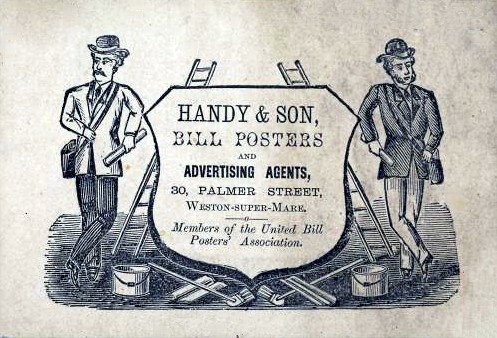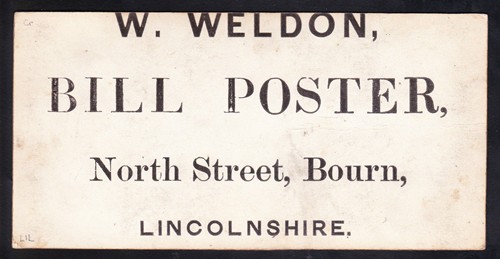|
Bill posters left no
vacant spaces

Trade card issued by Handy and Son, bill posters and advertising
agents, of Weston-Super-Mare, Somerset, in 1870.
Itinerant advertising today consists
mainly of those signs of graduated size announcing school or club
activities that appear overnight on the grass verges alongside the roads
into town. They cost little and reach a sizeable audience but in years
past the most popular method was bill posting, now illegal because it
created an eyesore in public places.
No free space escaped the attention of the pasters of posters with fences
and blank walls the main attraction, such as the gable ends of houses,
empty buildings, bridge parapets and the windows of empty shops, and
despite the ubiquitous and admonitory warning notice on many saying “Stick
no bills”, all were soon covered with gaudy announcements for forthcoming
events, fairs and circuses, sales, auctions and public meetings.
The hey-day of bill posting was during Victorian times, before radio and
television, when it became a fast and cheap method of reaching the people
with information and so one poster was often pasted on top of one another
and some of the more popular spots were soon bulging to a depth of several
inches. The advent of the cinema brought a fresh wave of gaudy
advertisements and by 1930 local authorities in some of the larger cities,
including London, were greatly concerned about the ruinous effect they
were having on the street scene.
One of the most well known bill posters in the county was William Welldon,
of North Street, Bourne, who achieved some prominence in his trade during
the 19th century. There were several men in the town so employed but
Welldon did the job for such a long period that he was reckoned to be the
oldest in Britain and earned himself a reputation as the "Father of the
Bill Posters", becoming a familiar figure in the district and walking
thousands of miles to carry out his work which he continued until he was
well over 90 years of age, five years before he died in 1916.
Another colourful character in the bill posting business was Mr Joseph
Edward Dallywater who was also the town crier at Bourne as well as being a
chimney sweep and landlord of the Red Lion in South Street. He also
achieved short fame in September 1899 by entering the lion's cage of a
Spanish travelling menagerie that was visiting Bourne, facing the lion and
remaining inside with the door locked for several minutes while he calmly
smoked a cigarette, after which he emerged unscathed amid the cheers of a
crowded audience. He lived to tell the tale and to post more bills but
only for a short while because he died prematurely in September 1901, aged
only 36.
During the early years of the 20th century, the work was carried out by
John Henry Pool who also had a variety of jobs around Bourne and apart
from running the market on Thursday and Saturday, he was also handyman for
Richard Boaler Gibson, the corn merchant who owned The Croft in North
Road, often working by mending grain sacks at the maltings in St Peter’s
Road.
His bill posting round was a busy one, with three large hoardings in
Bourne, one close to the railway station off South Street, another in
Coggles Causeway facing the railway line which ran close by and the third
underneath the railway bridge in Abbey Road. He also had a number of sites
in the villages around Bourne but despite the long distances involved, he
always completed his rounds on push bike with a leather satchel full of
bills over his shoulder and a bucket of paste and a brush fixed to the
cross bar. The paste was delivered wholesale to his home in Alexandra
Terrace, large barrels of the stuff straight from the factory but had to
be diluted before it could be used.
John was so dedicated to his work that he could be seen returning home
from his bill posting as farm workers were setting out to start their day.
The only occasion that he did use motorised transport was at election time
when the number of posters increased dramatically and as timing was of the
essence, he would hire a car and driver to take him around the many
designated sites. He was a busy man all his life and died in 1956 at the
age of 70.
Although posters became an art form and are widely admired and collected
today, the practice of pasting them on every available public space ended
their popularity. They became so widespread that the defacement nuisance
could not be ignored and local authorities, beginning with London County
Council, started to introduce bylaws prohibiting their use if they
disfigured the highway, the urban landscape, street furniture such as
railings and lamp posts, historic buildings or places of natural beauty,
and this initiative was eventually adopted throughout the country.
Official sites continue to be used to good effect but the placing of
unauthorised notices which despoil a neighbourhood, now known as fly
posting, carries heavy fines for the culprits and so occasional
advertising is confined to approved or private sites, shop windows and
official notice boards, and although they sometimes appear illegally on
roadside verges, local councils usually turn a blind eye to this practice
provided it does not cause a nuisance or generate complaints.
|
 |
|
William Weldon was a billposter in Bourne
during the 19th century when posters were an important method of
publicising forthcoming events, sales, auctions and official
notices, that were pasted up in public places such as on hoardings,
walls, fences and elsewhere around the town. There were several men
in Bourne so employed but Weldon did the job for such a long period
that he was reckoned to be the oldest in Britain and earned himself
a reputation as the "Father of the Billposters", becoming a familiar
figure in the district and walking thousands of miles to carry out
his work which he continued until he was well over 90 years of age.
He was also deeply interested in the work of the friendly societies,
joining the Bourne United Provident Association in 1841 at the age
of 19, and eventually becoming the oldest member of the club and
attending 75 annual meetings. Weldon also served as an officer of
the association and was for many years the treasurer. He died on
Monday 7th August 1916 at the age of 95. |
See also
Spreading the message with paper and
paste
John Henry Pool
Joseph Dallywater

Go to:
Main Index Villages
Index
|

